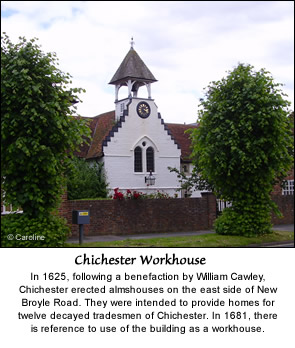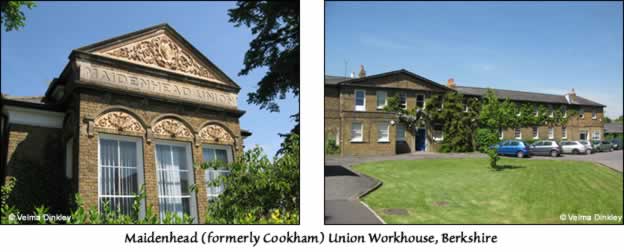Probably everyone with an interest in family genealogy will come across the term poor laws and the dreaded workhouse. So, what were they and why?

Family Tree Forum: Poor Law and Workhouse Records
The National Archive: Poverty and the Poor Laws
Workhouse: The People, the Places, the Life Behind Doors by Simon Fowler. ISBN 978-1905615285
Workhouse Children
The Union Workhouse
An example of county resources: Wiltshire and Swindon Archives Catalogue Search
You can find the names of overseers on Gloucestershire Record Office – Genealogical Search
West Sussex Records Office: Searchroom Leaflet No. 6: Sources for Family History
Sussex Record Society: Database of Poor Law records for West Sussex
The Editors
Poor Laws and the workhouse
It has long been recognised that a portion of society couldn’t look after themselves. A great part of this job was long done by the monasteries until their dissolution by Henry VIII. So in 1553, a statute ordered parishes to register their poor and to meet their responsibilities in relation to the local resources available. This was the start of the Elizabethan Acts known as the ‘Old Poor Law’, and it remained in force, with changes, until 1834. For more detail about the Settlement Act of 1662, see GENUKI: Lincolnshire, Poorlaws, Settlement Papers.

The ‘New Poor Law’ came into existence in 1834. The 15,000 or so parishes became poor law unions and there were three poor law commissioners heading it all. Each union was run by a locally elected board of guardians and the union and its workhouse was funded by the local poor rate, where each parish contributed in proportion to its poor relief expenditure of the previous three years.
The 1834 Union Workhouse Act laid out the following principle:-
“The Workhouse should be a place of hardship, of coarse fare, of degradation and humiliation; it should be administered with strictness and with severity. It should be as repulsive as is consistent with humanity”
Now when most of us think of the workhouse it’s ‘Oliver Twist’ and the Victorians we think of, but it has in fact been around a lot longer. There is a mention of a workhouse in Abingdon in Oxfordshire in 1631. But it was in Victoria’s reign that the idea that the poor were feckless and lazy became accepted and it was felt they would take advantage of any charity offered. So, it was decided to make conditions in the workhouse as harsh as possible. The first of this kind was built at Southwell in 1824, it became the prototype for all those which came after.
The workhouse system came into being after the Poor Law Amendment Act of England and Wales in 1834. Conditions were governed by the ‘Consolidated General Order’ which governed every part of workhouse life. The 1838 Irish and 1845 Poor Laws were slightly different.
The workhouse and the poor laws existed into the 20th century, leaving their mark long after their abolition; my mother was still announcing that we would all end up in the poor house in the 1970s.
Just Barbara
© Just Barbara 2009
Ralph Whitlock’s “A Victorian Village”
You might be interested to read Ralph Whitlock’s “A Victorian Village”. This is a study of several small Wiltshire villages (Pitton, etc.) near Salisbury.
A Victorian Village by Ralph Whitlock.
Published Hale 1990.
He explains that pre-1800, life in the villages, whilst not exactly idyllic, had sustained itself very well for a thousand years. Food and work for all, a rough and ready system of parish relief, a steady population.
He states that two things changed that. One was the Enclosures Act which basically took away the rights of villagers to graze and use common land, an important part of their agricultural economy.
The other was the passing of the Union Workhouse Act, which required that paupers live in a workhouse, having given up everything they owned. It was well-nigh impossible for a family to get back on its feet from this position.
Pitton went from a village which occasionally gave out-relief to a man who had broken his leg, say, or to a widow with a few children, to a village which had to send its paupers to the Salisbury Workhouse.
He gives other reasons for the sudden downfall in village life but basically it was dire poverty which had been thrust upon them by the Enclosures Act and the hated Union Workhouse system. I think many families would have headed for the towns and cities rather than enter the workhouse.
Olde Crone Holden
© Olde Crone Holden 2009